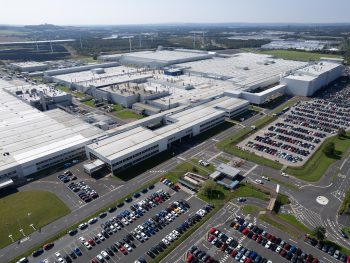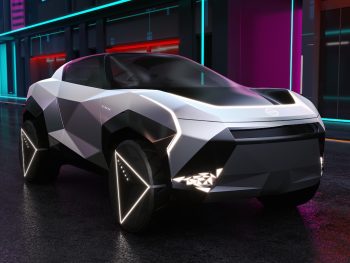Nissan to build three new electric cars at Sunderland under £2bn investment
Nissan is to build future all-electric versions of its flagship Qashqai and Juke crossovers, along with the next-generation Leaf, at its Sunderland plant.

The EV36Zero hub brings together three interconnected initiatives, covering electric vehicles, renewable energy and battery production
The commitment comes on the back of a £3bn investment in the three models, along with the required battery production and infrastructure, providing a big boost to the local economy and the UK at large.
The investment in the EV36Zero hub in Sunderland, Nissan’s blueprint for future manufacturing, provides security for Nissan’s 7,000 UK employees and the 30,000 jobs supported in the UK supply chain.
Nissan president and CEO Makoto Uchida said: “The EV36Zero project puts our Sunderland plant, Britain’s biggest ever car factory, at the heart of our future vision. It means our UK team will be designing, engineering and manufacturing the vehicles of the future, driving us towards an all-electric future for Nissan in Europe.”
While the current-generation Qashqai – the UK’s best-selling car of 2022 – and Juke were updated with full hybrids in 2021, they’ve not been available as fully electric cars before.
Today’s announcement changes this and follows Nissan’s confirmation earlier this autumn that all its new cars in Europe from now will be fully electric, and that it expects its passenger car line-up in Europe to be 100% electric by 2030.
The three future models will be inspired by concept models, two of which were recently unveiled at the Japan Mobility Show. The Juke will draw on the Hyper Punk Concept revealed at Japan while the Qashqai will be influenced by the Hyper Urban.
The Leaf will be based on the Chill-Out Concept, unveiled in 2021 and previously confirmed as the inspiration for a future EV to be built in Sunderland.
Nissan has led the investment at Sunderland along with partners. Its latest investment includes up to £1.12bn into its UK operations and wider supply chain for R&D and manufacturing of the two new models announced today, including facility and manufacturing process improvements, skills training, and tooling for suppliers.
This follows the £423m investment announced by Nissan in the first phase of EV36Zero for the first future EV; in July 2021, the Japanese automotive giant announced plans to transform the site into a flagship Electric Vehicle Hub under a £1bn scheme funded by investment by Nissan alongside battery tech firm Envision AESC and Sunderland City Council.
Its scheme brings together three interconnected initiatives, covering electric vehicles, renewable energy and battery production. The latter takes the form of new gigafactory, being built next to the plant by Envision AESC, which already owns and operates the existing battery plant in Sunderland, which produces packs for the Nissan Leaf electric family car built there since 2012.
A third gigafactory will now also be built under the latest expansion of the “transformational” EV36Zero hub.
Both vehicle and battery manufacturing will be powered by the EV36Zero Microgrid, which will incorporate wind and solar farms at Nissan and will have the capability to deliver 100% renewable electricity to Nissan and its neighbouring suppliers.
The UK government has separately awarded £15m of funding for a £30m collaborative project led by Nissan. It will strengthen the technical expertise and R&D zero-emission vehicle capability of the Nissan Technical Centre (NTCE) in Cranfield, Bedfordshire, increasing opportunities for securing additional UK R&D investment in future vehicle models.
Today’s news follows last week’s government pledge of over £2bn to support the manufacturing, supply chain and development of zero-emission vehicles. Now confirmed in the Autumn Statement, the funding is part of an overall £4.5bn package for strategic manufacturing sectors.
Prime Minister Rishi Sunak said: “Nissan’s investment is a massive vote of confidence in the UK’s automotive industry, which already contributes a massive £71bn a year to our economy. This venture will no doubt secure Sunderland’s future as the UK’s Silicon Valley for electric vehicle innovation and manufacturing.”
Mike Hawes, chief executive of the Society of Motor Manufacturers and Traders (SMMT), commented: “This new announcement from Nissan – coming on the back of billions recently committed by other manufacturers and supported by the UK government – underlines Britain’s position as an increasingly competitive location for electric vehicle production. It is tremendous news for the company, its workforce, the region and the UK’s supply chain, which will drive economic growth and decarbonisation across the UK.”
Further information about the three Nissan models, including names, specifications and launch dates, will be released at a later time.


